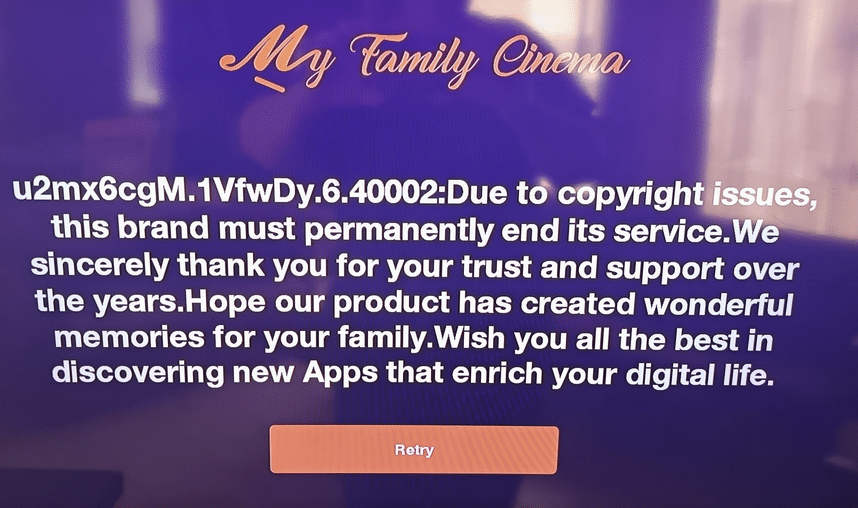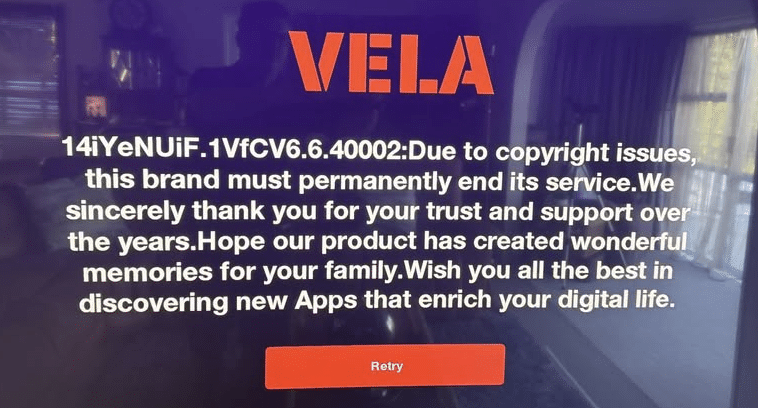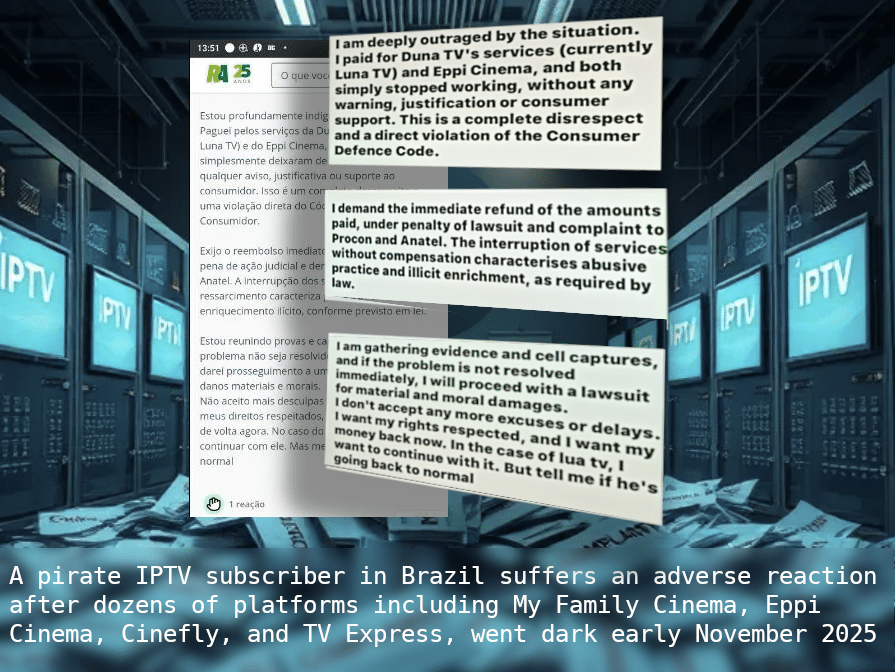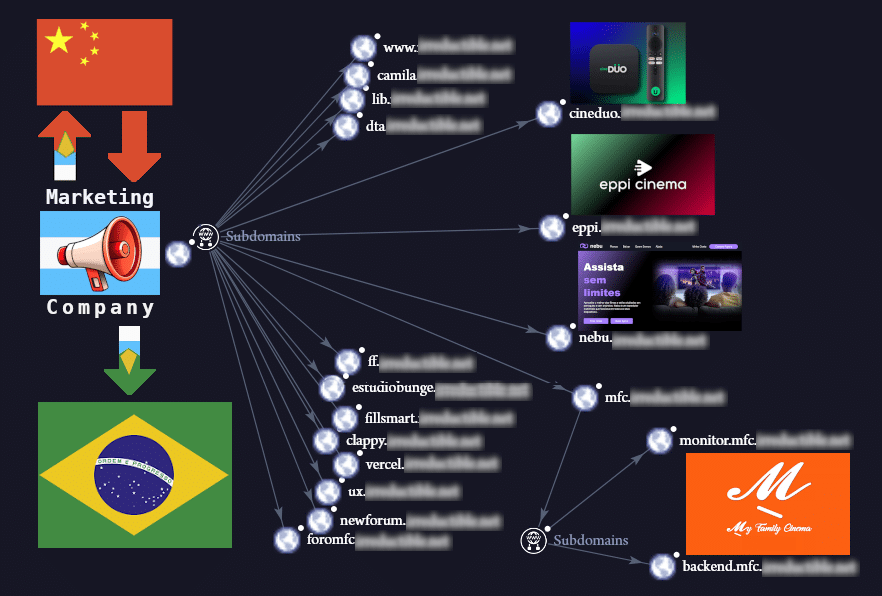Early September, a massive law enforcement operation in Argentina targeted a global IPTV piracy network’s business in Latin America. The aim was to shut down dozens of branded services including My Family Cinema, TV Express and Eppi Cinema, that were being targeted at the Brazilian market. With surprisingly few concerns that reliability of IPTV services could nosedive, last weekend that’s exactly what happened in Brazil.
From: TF, for the latest news on copyright battles, piracy and more.
 The action in Argentina two months ago was announced with a reasonable level of detail. Targeting dozens of IPTV services with an estimated eight million global subscribers, Spanish football league LaLiga described the operation as “historic” and as the dust settled, its importance wasn’t in doubt.
The action in Argentina two months ago was announced with a reasonable level of detail. Targeting dozens of IPTV services with an estimated eight million global subscribers, Spanish football league LaLiga described the operation as “historic” and as the dust settled, its importance wasn’t in doubt.
Targeting a Network with Eight Million Subscribers
Following an investigation by the Cybercrime Prosecutor’s Office of San Isidro (UFEIC), most likely fueled by investigations carried out by LATAM anti-piracy group Alianza, MPA/ACE, Nagravision, and others in the region, local police raided four office buildings in Vicente López, Buenos Aires.
The raids were conducted under the authority of San Isidro Guarantees Court No. 4 and images of DDI agents and tables covered with cash were soon circulating online. Publishing a statement containing a long list of branded and ‘dismantled’ IPTV services can end badly; however, LaLiga seemed unusually confident that resurrection wouldn’t play a role here.
LaLiga Seemed More Confident Than Usual
While there were no immediate reports of an existential IPTV crisis in Brazil, complaints about service issues were still quick to arrive and only seemed to increase throughout September.
Services Start Shutting Down
On-screen notices announcing a service’s demise aren’t especially common but since early September, IPTV subscribers in Brazil have been exposed to quite a few of them.
An early casualty was ‘My Family Cinema’ which had been one of the most recognizable IPTV brands in the region. The notice reportedly came via a set-top box update; some reports implied that updates were probably required to get back in the game.
End of the road for “this brand”…
LaLiga’s presumed confidence that services wouldn’t rise from the dead seemed to look a little precarious given the terminology in the shutdown announcement. Indeed, some former customers claimed that My Family Cinema was subsequently “taken over” by another service called VELA.
Intermittent service and other errors were reported there too, at least for a while.
Easy come, easy go….
Reports that My Family Cinema was still partly operational continued through October but perhaps more ominous news had already began to surface.
People keen to renew their subscriptions to various services complained that was no longer possible. Some said that after ‘upgrading’ to VELA and upgrading again to another substitute service (Konex), payments were successful. Or rather, payments went through as expected but resulted in either no service or a service with ads.
With some users preparing to dust off their torrent clients and others mulling the pros and cons of YouTube, heated discussions over consumer rights – including the possibility that the services were executing some kind of exit scam – helped to descend the situation further into chaos.
From a rightsholders’ perspective, mistrust and declining confidence in piracy are valuable commodities. Few things focus the mind more than throwing good money after bad, and if pirates pick up the blame, it doesn’t get much better than that.
Consumer rights failure…
Two Months After the Raids – Why Now?
Official news on how the case is progressing appears to be almost non-existent.
A comment from anti-piracy group Alianza confirmed that the legal process is indeed under seal. The practical issues observed on the ground are probably linked to advances made by the Argentine Public Prosecutor’s Office in its ongoing investigations against the platform’s operators, the theory goes.
Other information provided by Alianza clarifies that the eight million subscriber estimate concerns the network’s peak worldwide. Working on the basis of 6.2 million subscribers more recently, Alianza claims that 4.6 million subscribers can be found in Brazil, together generating between US$150 million and US$200 million.
As for the network’s operational structure, Alianza president Jorge Bacaloni says that management, IT/technical, and financial matters are handled in China.
The investigation in Argentina reportedly concerns a ‘command center’ that controls/coordinates pirate services across the region. An office in Buenos Aires was reportedly responsible for marketing the services and for what could be over US$100m in global piracy sales.
Common Denominator For Popular Brands
Since there are signs that new services are easily launched and if necessary, devices with subscriptions to defunct services can be remotely updated to access another service, common ownership/control seems a reasonable explanation, in broad terms at least.
Proving that’s actually the case to a criminal standard is quite rightly a matter for the prosecutor’s office. However, if there’s a central marketing/sales operation common to some or even all of the named services, that should be much easier to discover.
Since Alianza provided no real clues, we cannot say whether the marketing company apparently used by some of the IPTV services is just a marketing company, or whether it’s THE marketing company referenced by Alianza.
What we can confirm is that in this instance, zero effort was expended to hide the connections, despite that being technically trivial. What that says in the bigger picture, if indeed it says anything at all, is for the prosecutor’s office to determine.

Other signs that the overall business was approached from otherwise legitimate angles, include the trademark applications for ‘My Family Cinema’ filed in Paraguay.
Given that there are copyright complaints filed against several branded services and other entities with links to them, why it took around six years to take action is unclear. Perhaps timing and opportunity are still the most important factors.
From: TF, for the latest news on copyright battles, piracy and more.
 Mit besserer Technik als früher, offiziellen Lizenzen und Frauenfußball versucht Football Manager 26 frisch ins Spiel zu kommen. (Sportspiel, Sega)
Mit besserer Technik als früher, offiziellen Lizenzen und Frauenfußball versucht Football Manager 26 frisch ins Spiel zu kommen. (Sportspiel, Sega)  Mit besserer Technik als früher, offiziellen Lizenzen und Frauenfußball versucht Football Manager 26 frisch ins Spiel zu kommen. (Sportspiel, Sega)
Mit besserer Technik als früher, offiziellen Lizenzen und Frauenfußball versucht Football Manager 26 frisch ins Spiel zu kommen. (Sportspiel, Sega)  Paramount Skydance ist im Umbruch. Ein prominentes Opfer ist der Film Star Trek 4, der über Jahre hinweg entwickelt wurde. Damit ist es vorbei. (
Paramount Skydance ist im Umbruch. Ein prominentes Opfer ist der Film Star Trek 4, der über Jahre hinweg entwickelt wurde. Damit ist es vorbei. ( Aviv Ben-Yosef kennt die Probleme von Tech-Leadern genau. Im Newsletter spricht er über micromanagende CEOs, gestresste Devs und die Vorteile von KI. (
Aviv Ben-Yosef kennt die Probleme von Tech-Leadern genau. Im Newsletter spricht er über micromanagende CEOs, gestresste Devs und die Vorteile von KI. ( Die Reform des Hackerparagrafen ist seit Jahren geplant. Die neue Regierung prüft das Thema noch. (
Die Reform des Hackerparagrafen ist seit Jahren geplant. Die neue Regierung prüft das Thema noch. ( An den Ermittlungen waren unter anderem Kölner Einsatzkräfte beteiligt. Die Täter sollen mit hohen Renditen für Fake-Investitionen geworben haben. (
An den Ermittlungen waren unter anderem Kölner Einsatzkräfte beteiligt. Die Täter sollen mit hohen Renditen für Fake-Investitionen geworben haben. ( Bei Amazon gibt es derzeit einen interessanten Mini-Beamer zum Sparpreis im Angebot. Er ist für keine 50 Euro erhältlich. (
Bei Amazon gibt es derzeit einen interessanten Mini-Beamer zum Sparpreis im Angebot. Er ist für keine 50 Euro erhältlich. ( The action in Argentina two months ago was announced with a reasonable level of detail. Targeting dozens of IPTV services with an estimated eight million global subscribers, Spanish football league LaLiga described the operation as “historic” and as the dust settled, its importance wasn’t in doubt.
The action in Argentina two months ago was announced with a reasonable level of detail. Targeting dozens of IPTV services with an estimated eight million global subscribers, Spanish football league LaLiga described the operation as “historic” and as the dust settled, its importance wasn’t in doubt.




 Windows 10 bleibt trotz Supportende fast mit Windows 11 gleichauf. Viele sind offenbar auch ganz von Windows weggekommen. (
Windows 10 bleibt trotz Supportende fast mit Windows 11 gleichauf. Viele sind offenbar auch ganz von Windows weggekommen. ( Das Moto Edge 70 ist 5,99 mm dünn, soll aber widerstandsfähig sein. Außerdem neu von Motorola: das Moto G57 Power mit 7.000-mAh-Akku für 250 Euro. (
Das Moto Edge 70 ist 5,99 mm dünn, soll aber widerstandsfähig sein. Außerdem neu von Motorola: das Moto G57 Power mit 7.000-mAh-Akku für 250 Euro. (